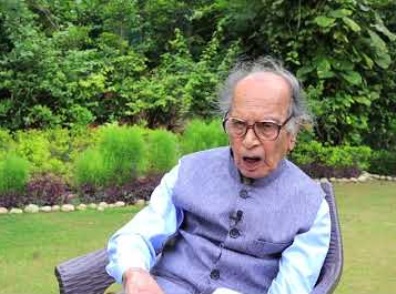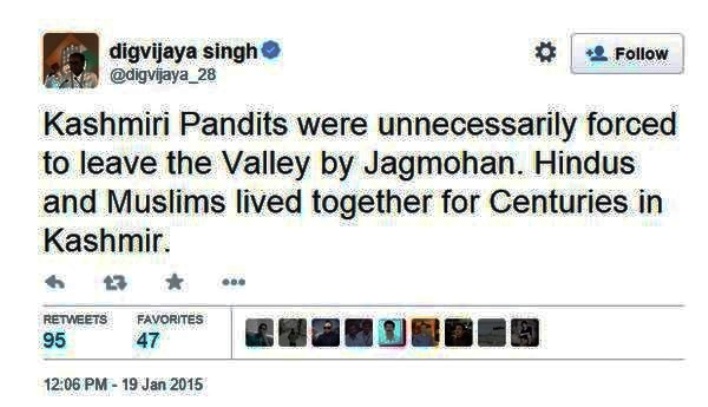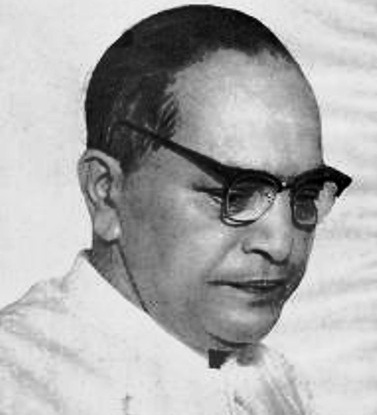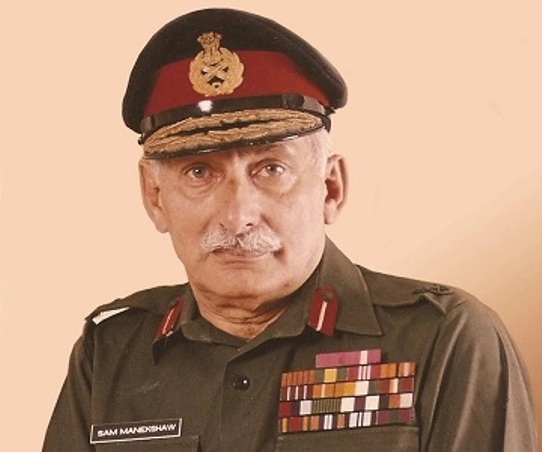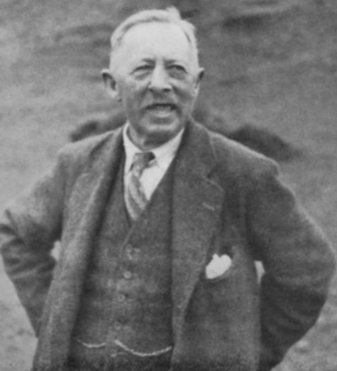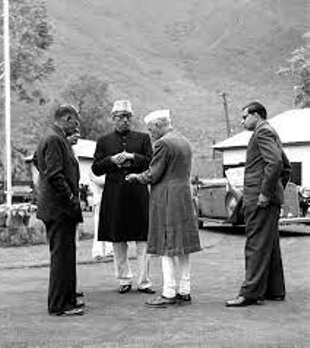We the Peoples of the United Nations, determined to reaffirm faith in fundamental human rights, in the dignity and worth of the human person, in the equal rights of men and women and of nations large and small: United Nations Charter
The most powerful force in the world today is neither communism, nor capitalism, neither the H bomb nor the guided missiles. It is man´s eternal desire to be free and independent. President John F. Kennedy (1957)


FUNDAMENTAL FREEDOM IN KASHMIR: UN CHIEF
UN Secretary General Antonio GUTERRES in a very sincere endeavour offered mediation between nuclear powers India and Pakistan to solve Kashmir as per the wish of Kashmiri people. Pakistan welcomed the proposal but India as usual brazenly snubbed His Execellency, the Secretary General and warned him to keep his hands off Kashmir. The world needs to understand the stubborn comport of India with utter disregard for human rights, rule of law and maintenance of peace. UN must impress upon India to respect international obligations and adhere to the commitments made to people of Kashmir through various UN Resolutions.
US STATE POLICY"Our policy on Kashmir has not changed," said a State Department spokesperson when asked if the designation indicated a change in the US policy on Kashmir, which Washington sees as a disputed territory. American statement describes occupied territory as Indian-administered Jammu and Kashmir and Washington sees Kashmir as a dispute that needs to be resolved peacefully.
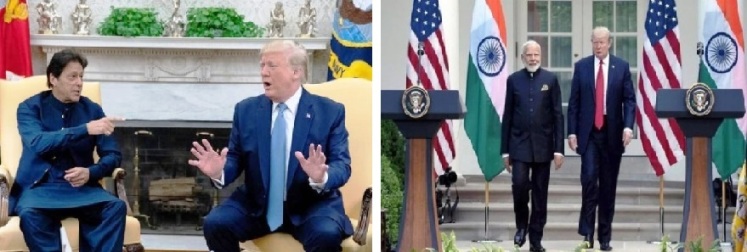 President Donald Trump (January 20, 2017 - January 20, 2021) |
INDIA BLUSTERS PAKISTAN WITH FIRST NUCLEAR STRIKE
At his Oval office in Washington President Donald Trump revealed to Prime Minister Imran Khan that Prime Minister Modi of India had urged him to intervene and mediate to resolve the long standing Kashmir issue. President futher said he was ready to mediate as this beautiful place where bombs are flying all around needs a solution. India later conveniently called President Trump a "LIAR". The killers of Gandhi can go to any extent and Mr Modi is quite aware of it. Like his predecessors President Trump made the official stand on Kashmir policy known that Kashmir needs a solution keeping in view the volatility of the political situation in the South East Asian region. A consensus on international level is developing that Kashmir is a nuclear flash-point and needs an immediate attention.
 |
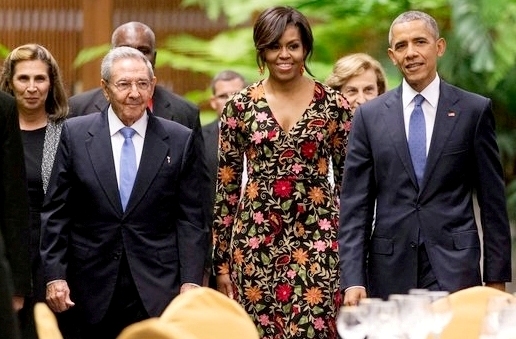
|
(January 20, 2009 - January 20, 2017)
President elect Barrack Obama calling Kashmir ´an interesting situation´ (October, 2008) said he was ready to explore US's role to devote serious diplomatic resources to get a special envoy in Indian sub-continent to figure out a plausible approach". (Daily Times). The former US President, Bill Clinton could be chosen as a special envoy on Kashmir issue. He further stated that "Clinton had had an experience dealing with such problems. To substantiate his claim President Obama said that Clinton had played a vital role in ending the ´Kargil crises´ in Kashmir in 1999.
President Obama, as reported, remained optimistic about changing the regional dynamics, recognising that Kashmir was ´obviously a potential tar pit´ for American diplomacy. Kashmiris overwhelmingly felt encouraged by the optimism displayed by President Obama during his last phase of poll campaign, that if he won the election he would like to mediate between India and Pakistan to try to resolve the Kashmir issue.
First Lady Michelle Obama maintains the tradition to keep memories of Kashmir alive in the WHITE HOUSE. The Presidents of USA are quite familiar with master pieces of hand work like Kashmiri Crewel embroiderd drapery, Walnut furniture including screens and world famous Paper Machie. Madam Obama, for an important occasion, dresses up in the finest and exquisite crochet Kashmiri outfit and all say she just looked fascinating.
 President Bill Clinton (1993 - 2001) |
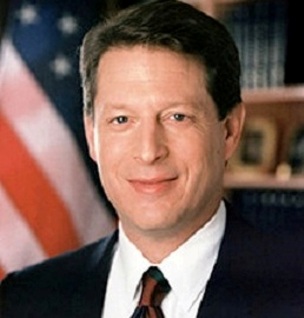 Vice-Pre Richard AlGore (1969 - 1974) |
In his address to the United Nations General Assembly on September 27, 1993 President Clinton stated "Thus as we marvel at this era´s promise of new peace, we must also recognise that serious issues remain. Bloody ethnic, religious and civil wars rage from Angola to the Caucasus to Kashmir, as weapons of mass destruction fall into more hands, even small conflicts can threaten to take on murderous proportions". And on December 27, 1993 the Presidend added to state that "In order to face the dilemmas of a post-cold war global landscape, we all must look closely at our policies with regard to human rights. I am confident that we can bring about changes that are consistent with what the UN founders envisioned helping bring peace to Kashmir".
On human right violations and the brute force used by Indian army in Kashmir the Vice-President AlGore stated that "The United States deplores the excessive use of force being employed against civilians in Kashmir; The United States urges the Government of India to reopen Kashmir to the media, to human rights organisations, and to the International Red Cross and other relief groups; the United States should provide humanitarian assistance to the civilians of Kashmir during the ongoing crises, and should encourage other governments to assist in relief efforts".
PIECE OF ADVICEAn estimated one million Kashmiris marched through the streets of Srinagar, the disputed state´s capital, on Friday, Aug. 22, 2008 demanding freedom - azadi - from Indian rule. A harsh crackdown followed. The message should be that exacerbating the trouble in Kashmir will only make things worse between us. At the same time, it should urge the Indians to show restraint. This includes reining in their natural tendency to pin the blame on Pakistan for their own mistakes in dealing with the Kashmiris. THE WASHINGTON TIMES September 3, 2008
A senior White House official said that US ties with India were not at the expense of it relations with Pakistan
KUWAIT CONDEMNATIONKuwait News Agency describes the unrest in Kashmir saying that situation in Kashmir continues to deteriorate as there has been a considerable increase in attacks by Kashmiri militants fighting India army. There have also been violent clashes on the ceasefire line of armies of two nuclear armed neighbours on regular basis. In the recent past, exchange of fire forced people living on either side of the de-facto line of control to flee their homes for safer places.
President Richard M. Nixon (1969 - 1974) stating an official position of US government on Kashmir reiterated that "In order to avoid a potential nuclear conflict between Pakistan and India over Kashmir, we should urge New Delhi to end the massive violations of human rights by its security forces in the province and to negotiate an autonomy agreement with the Kashmiri leaders".
Ms Robin Lynn Raphel, Assistant Secretary of State (October 29, 1993) stated "Let me clarify by saying simply we agree that the people of Kashmir have got to be consulted in any kind of final settlement in the Kashmir dispute, because we believe at this point there is no way that any resolution can be stable and lasting unless agreed to by the people of Kashmir. Asisstant Secretary further added "And what we have said to the Government of India is you need to make security forces accountable for their own behaviour. And making people disappear, encounter killings, extrajudicial killings, deaths in custody, all this stuff; frankly, there is no excuse for". And on October 29, 1993 while stating the political status of Kashmir Ms Raphel further said "We view Kashmir as a disputed territory. We do not recognise, and that means we do not recognise that instrument of accession as meaning that Kashmir is forevermore an integral part of India.
Senator Harry Mason Reidfrom Nevada on June 26, 1992 stressed that something must be done in this regard. The Kashmiri people have suffered hardship, including torture, rape, and untold number of deaths, not to mention the destruction of their property and their economy. We here in the Senate must urge India to allow international humanitarian groups into Kashmir; we must urge India to allow foreign reporters into the area; and we must also urge India to allow a plebiscite so that the people of Kashmir may determine their own destiny".
Bertrand Russell British Philosopher, logician, mathematician, historian and social critic speaks on Kashmir and says "When one observes that the high idealism of the Indian government in the international matters breaks down completely with the question of Kashmir, it is difficult to avoid a feeling of despair"
Congressman Dan BurtonU.S Representative for Indiana 5th congressional district recognizing Kashmir´s fundamental right to a plebiscite stated "I believe that the people of Kashmir must be given a voice in their own future. For this reason, I introduced House Resolution 144, the Freedom for Kashmir Resolution. It calls on the President, the UN and the international community to use all possible measures to establish the conditions needed for a plebiscite. Whether the people of Kashmir wish to remain in India, join Pakistan, or become independent, the decision must be made by the people of Kashmir themselves. All the Kashmiris want is the opportunity to vote ".
American Ambassador to India Loy W Henderson (Aug 1947-April 1948) with his wife came to Kashmir to discuss further to find a solution and looked at the possibility for an independent Kashmir. Mr Henderson went back to Delhi and answering a question Loy said: "Nehru was irritated about our policies with respect to Kashmir. He felt that we were not cooperating as we should with Indian efforts to retain all the areas of Kashmir that the Indian troops had occupied. Pakistan, unlike India, had tried to establish close friendly relations with the United States, and when the United States had responded in kind Nehru was not only displeased but caused vexation to the stand taken by U.S."
Much talked about Sir Owen Dixon plan for decades, many believe, can provide lasting peace and a final solution for the vexed problem of Kashmir. On 27th May, 1950, diplomat Chief Justice of Australia Sir Owen Dixon was appointed by UNO to negotiate a solution for carving out an independent Kashmir. India tried all foul means to change the demographic character of Kashmir and failed for the simple reason that Kashmir has always been a sovereign and independent nation. Come what may people of Kashmir are in no mood to accept any other political arrangement. India finally, in frustration, resorted to use of brute force to subjugate the people by hook or by crook. In the last twenty two years more than one hundred thousand people have been killed mercilessly, hundreds of women raped, thousands disappeared perished in Indian torture chambers and millions worth of property razed out of vengeance.
From 1942 to 1944 Dixon was invited to act as official mediator between the governments of India and Pakistan over the disputed territory of Kashmir. His role was to continue conciliation talks between the two nations in the lead up to a proposed plebiscite to be put to the residents of Kashmir and to do this, Kashmir had to be given into the charge of UNO which it seems did not go very well with lots of interested parties and the proposal was scuttled once again. In the year 1950, the powers of the world were inclined and had agreed in principle to give guaranteed financial support and Dixon plan provided the corridor and an opportunity for an acceptable solution, agreeing to create an independent sovereign nation of Kashmir. India always was always a stumbling block to scuttle every move in this direction on international level.
General McNaughton backed proposals of UN Security Council and in the Resolutions adopted on August 13, 1948 and January 5, 1949, McNaughton´s proposals contemplated an agreed program of progressive demilitarization on either side of the cease-fire line. Army withdrawal, disbandment and disarmament in such stages as not to cause fear to populace at any point. Governments of India and Pakistan to reach agreement by 31 January 1950 on progressive steps taken in reducing and redistributing the forces to the minimum level complete with the maintenance of security and of local law and order. India turned a deaf ear to all these efforts made on international level.
Prime Minister, Louis Stephen St-Laurent of Canada (1948-57) supported the Kashmir cause and stressed all along that Kashmir needs a solution as per the wish of Kashmiri people through a plebiscite supervised by United Nations.The official Canadian stand on Kashmir is widely misunderstood in India as the good gesture of help offered to solve this vexed problem.These sincere offers, in a brazen defiance are ignored putting the regions security at risk.The offers of mediation on international level are rejected and all sincere efforts taken as a weakness rather than a constructive disposition to save the world from a catastrophic outcome.
Canadian Conservative party Prime Minister Stephen Harper regards Kashmir as the unresolved issue and intensification of systematic human rights violations against civilians in Kashmir as a matter of concern. Harper government´s Foreign Minister John Baird stating Canada´s official position on Kashmir said "Ottawa takes the issue of a peaceful solution to the dispute seriously and continues to monitor the situation in Kashmir". Kashmir keeps its fingers crossed and watches the development of new Canada-India relationship closely to see how it affects Canada´s previous unstinting support for Kashmir.
William W Baker a renowned author and historian says "Locked in a death struggle for survival and the right of self-determination, this historic Valley of Beauty has become a Valley of Death! A country of thirteen million people, primarily Muslim inhabitants, face on a basis, the bullets and brutality of an occupation army of Indian Hindu soldiers. One is hard pressed to discover any comparable contemporary conflict capable of possessing an equal amount of naked brutality, inhumanity and intolerance as that experienced by the Kashmiri people over the past forty-seven years under occupation".
The ruling elite of India in the guise of "democracy" remote controlled by its formidable army guided by fascist ideology believe in greater India with expansionist designes to annex all neighbouring independent countries to realise the dream of ´Mahabharat´. There is hardly a country bordering it that has not been messed up with. In this connection Kashmir suffered the most and it is noteworthy that not a single country on international level considers Kashmir to be India´s internal matter or accepts the bogey called integral part.
THE INDEPENDENT ST. PETERSBURG, FLORIDA
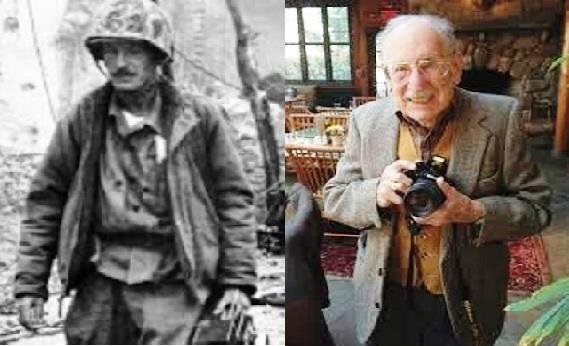
Ms Laura Schuurmans Dutch scholar and analyst termed the geo-political implications of Kashmir dispute a grave global concern stressing that the dispute can no longer be considered a bilateral issue between India and Pakistan. She quipped "how is it possible that on one hand the international community raised East Timor issue so fervently but continued to keep its eyes shut on Kashmir". An unresolved Kashmir presents a real threat to regional peace and security.
Schuurmans further said that Kashmir Issue needs to be analyzed from a humanitarian angle, wherein an outright repression, violation of human rights and strong discontentment among Kashmiris has reached an unprecedented level. The longer the international community continues to overlook these human rights violations, the worse the impact is going to be, not only on the suffering of the people of Kashmir but the geopolitical implications of the dispute directly affects the peace in Afghanistan as the other two nuclear neighbours China and Pakistan cannot remain unaffected or unconcerned. The borders of China and Pakistan having direct connection with Kashmir have had historical, traditional, cultural and trade linkages. The conflict has the potential for a threat to both regional and global peace and trigger a nuclear conflict, a serious threat which must not be ignored.
W.R LAWRENCE in his The Valley of Kashmir mentions "The Government of India used Sheikh Abdullah as its agent to stir up communal trouble in Srinagar in 1931 so as to destabilise the State of Jammu & Kashmir and thereby force the Maharaja Sir Hari Singh to give in to British pressure."
Howard and Teresita SchafferDeputy director of the Institute for the Study of Diplomacy at Georgetown University Late Howard Schaffer completed his book on the U.S. role in Kashmir and wrote on Wednesday, September 3, 2008 in The Washington Times:Kashmir´s fuse alight: "Kashmir is again becoming very dangerous. Stabilizing Afghanistan, avoiding a potential nuclear face-off between Pakistan and India, and steadying the fragile democratic government in Pakistan are critical U.S. interests today, far more than in previous decades.They are all at risk if Kashmir sparks a new India-Pakistan crisis. The United States can ignore Kashmir only at its own peril".
European Union has reaffirmed its commitment to the settlement of disputes by peaceful means in accordance with international law, bilateral agreements and the principles of the UN Charter. The salient features of the Resolution of European Parliament (May 24, 2007) on more than seven decades Kashmir conflict highlights armed conflicts between India, Pakistan and the one India had with China quoting sources saying eighty thousand lives lost, the dispute now includes international terrorism, continuation of human right violations, killings and rapes in an atmosphere of impunity.
The resolution stresses that peace can be achieved jointly by constant engagement between India and Pakistan involving people of state of Kashmir, and an honest effort can promote a genuine breakthrough in seeking a resolution of the Kashmir dispute. While deploring the continuing political and humanitarian situation, emphasising the aspirations of the people, the need for a political settlement of the issue has enhanced, not diminished and the relevance of the United Nations remains an important forum for dialogue and diplomacy.
Jason Burke (Guardian: December 06, 2001) reports that 500 perpetrators of human right abuses are identified from low-ranking policemen to Indian army generals.The report says that many army personnel and generals have been decorated for the outstanding feats performed to crush Kashmiri population which include shootings, abductions, torture and rapes.Though violence, as claimed, has subsided in recent years, in part due to warm relations with neighbouring Pakistan, the Indian army establishment for unknown reasons believes the potential for renewed conflict in Kashmir to remain high.
The report further says that a US diplomatic cable leaked by Wiki Leaks and published by the Guardian in December 2010 revealed a briefing to the US embassy in Delhi describing continuing torture and arbitrary detention by Indian army in Kashmir. The dispatches revealed the concerns about the use of electrocution, beatings and sexual humiliation against hundreds of detainees. Other cables show that American diplomats were concerned about widespread human right abuses by Indian security forces, who they said relied on torture for confessions.
With victims numbering around ten thousand, Kashmir has surpassed the figures of Sierra Leone, Sri Lanka and Chechnya. A media portal of UK maintains that non-governmental organizations hardly took interest in documenting the plight of these silent sufferers of Kashmir. This has even been admitted by UN Special Representative Margot Wallstrom when she recently said. "It has become such a way of life in some conflict zones like Kashmir that many victims are simply too afraid to report it and you can understand that," And even in those cases, where the victims manage to transcend these fears and report the matter to police, they achieve little or no justice because of the legal immunity provided to the erring soldiers.
CREDIBILITY OF "INCREDIBLE INDIA"
One morning of Dec-Jan 1990, notorious Indian CRPF (Central Reserve Police Force) knock at the door of Abdul Ahad Bhat of Batmaloo, Srinagar and demand the TV set to watch their favourite program Ramayana. The lady of the house opens the door to find uniformed armed infantry men staring at her with the demand and the next minute she collapses and is rushed by her relations to the hospital to be declared dead. In Kashmir incredible India does such miracles on daily basis.

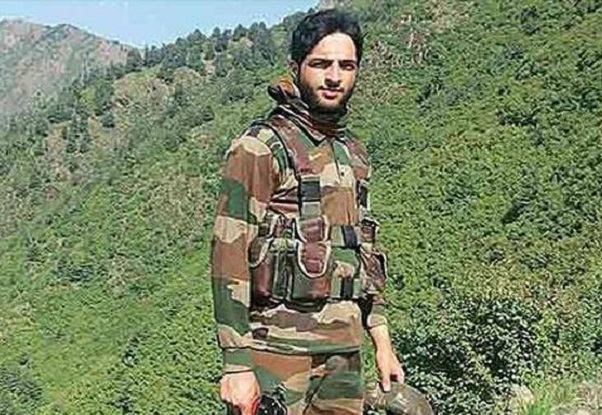





































































 Military Curfews do not deter masses from coming out on the roads to protest Indian rule and continue the fight with stones and bricks to convey the message that India must leave Kashmir. Indian overtures towards Soviet Union were tactfully planned mainly to use USSR VETOs to frustrate rest of the world denying to hold the promised plebiscite in Kashmir. India´s truculent behaviour paid dividends leaving Kashmir simmering on the burner
Military Curfews do not deter masses from coming out on the roads to protest Indian rule and continue the fight with stones and bricks to convey the message that India must leave Kashmir. Indian overtures towards Soviet Union were tactfully planned mainly to use USSR VETOs to frustrate rest of the world denying to hold the promised plebiscite in Kashmir. India´s truculent behaviour paid dividends leaving Kashmir simmering on the burner
